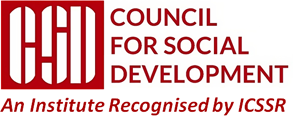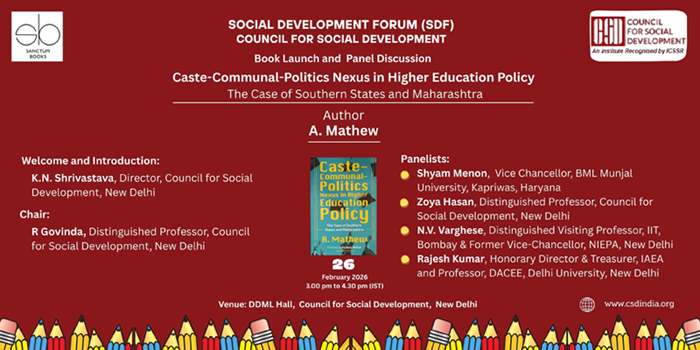Social Development Forum
SDF invites you for a Discussion on “Shrinking Government Jobs and Trivialising Reservation What Does Data Tell Us”
Date: 30 May 2024
Read More
SDF invites you for a Discussion on “Policy Discourse on the Transgender Rights in India”
Date: 02 May 2024
Read More
SDF invites you to talk on Indian Universities under Neoliberalism: Re-Examining issues of Autonomy and Accountability
Date: 12 March 2024
Read More
SDF presents School Leadership in Improving the Public Schools SDF Case Study of Bihar & Tamil Nadu
Date: 15 February 2024
Read More
Social Development Forum discussion on Ïmplications of COP28 for the Indian Economy
Date: 18th January 2024
Read More
Quality of Drinking Water in Urban Areas: A Case Study of Delhi
Date: 14th December 2023
Read More
Japanese Employment Practices in Japanese Manufacturing Firms in India: Results of the 2021 Questionnaire Survey
Date: 16th November 2023
Read More
Can Universal Health Coverage achieve the goal of health for all in India: A theoretical and empirical exploration
Date: 2nd November 2023
Read More
Agricultural Marketing in Africa and India: Some Reflections
Date: 11th October 2023
Read More
Discussion on Biological Diversity (Amendment) Bill 2023 and Biological Diversity Act 2002: A Comparison
Date: 18th August 2023
Read More
Galvanising the Ship of the Indian State: An Agenda for Research and Dialogue
Date: 31st July 2023
Read More
Academic Autonomy Needed a Holistic Societal Perspective
Date: 27 June 2023
Read More
Minority Women’s Movements and Struggles against Gender Unjust Religious Personal Laws in India and Bangladesh
Date: 8 March 2023
Read More
Decoding the Union Budget 2023-24
Date: 6 February 2023
Read More
Women’s Labour and Welfare in the Extractive Industries: A Comparative Analysis of Coal and Iron Mining in India, 1941-2015
Date: January 30, 2023
Read More
Dharavi: Dealing with the Spectre of Redevelopment in the Throes of a Pandemic
Date: 22 December 2022
Read More
The Caste Question in Hindi Cinema: Where are Dalits in Bollywood?
Date: 25 November 2022
Read More
Water, Sanitation and Hygiene in Urban India
Date: 8 July, 2022
Read More
Migration as an Agent of Rural Transformation
Date: 5 May, 2022
Read More
Recent Development in Indian Agriculture: New Farm Laws, Protesting Farmers and Food security Concerns
Date: 28th October, 2021
Living Together but Separately – Everyday Lived Experiences of Foothill Villages and Towns in Assam – Nagaland Border
Date: 28th September, 2021
Read More
The Missing ‘Welfare’ of Dalits and Adivasis in Welfare Measures of the Indian State
Date: 20th August 2021
Read More
Dalits in Contemporary India: Examining through a Prism of Educational Inequality, Poverty Incidence and Entrepreneurship among them
Date: 24th June 2021
Read More
COVID-19 and Climate Change induced Disasters: Impacts, challenges and prospects for Indian women farmers
Date: 27th May, 2021
Read More
India’s Performance on the SDG 6 Index: Addressing the data gaps
Date: Apr 15, 2021
Read More
Preparedness for reopening of schools amidst COVID-19 pandemic
Date: 28th January 2021
Read More
Land Right Movement of Dalit Women in Marathwada: Combating Poverty, Hunger and Gender Inequality
Date: March 19, 2020
Read More
Ambedkar’s Theory of the Social: The Universal Condition of Recognition
Date: February 13, 2020
Read More
Witch-hunts in India… and elsewhere
Date: 30th August, 2019
Read More
A Glimpse into the Minds of the Aged in terms of Guilt and Other Related Factors
Date: May 16, 2019
Read More
is this Azaadi? Everyday Lives of Dalit Agricultural Labourers in a Bihar Village
Date: 12 March 2019
Read More
Story of a Farmers’ Struggle in Rajasthan: Six Decades of Struggle and No Success
Date: January 31, 2019 (Thursday)
Read More …
Health beyond Medicine – Panel discussion
Date: May 17th 2018
Read More
Agitation to Legislation: Negotiating Equity and Justice in India
Date: April 26, 2018
Read More
Regulating the Medical Profession: Challenges and Possibilities in the National Medical Commission Bill 2017
Date: March 22, 2018 (Thursday)
Read More …
Constitutional and Social Democracy: An Ambedkar Perspective
Date: January 18, 2018
Read More
Jagged Edges
Date: October 30, 2017
Read More
Annual Discussion on Union Budget 2017-18
Date: February 23, 2017
Read More
Total Literacy Campaign: Past, Present and Future
Speaker: Dr L D Mishra
Chair: Professor J B Tilak, Distinguished Professor, CSD and Former Vice-Chancellor, NUEPA
Date: November 16, 2017 (Thursday)
Time: 3.00 pm
Venue: Durgabai Deshmukh Memorial Lecture Hall, CSD, Sangha Rachna, 53 Lodi Estate, New Delhi 110003
Read More …
SDF Publications
Read More …
The Idea of Universal Basic Income
Date: April 06, 2017
Time: 3.00 pm to 5.30 pm
Venue: Durgabai Deshmukh Memorial Lecture Hall
Forthcoming Elections in UP: Promises and Possibilities
Speakers: Professor Sanjay Kumar & Professor Badri Narayan
Chair: Professor Manoranjan Mohanty
Date: January 25, 2017 (Wednesday)
Time: 3.00 pm
Venue: Durgabai Deshmukh Memorial Lecture Hall, CSD,Sangha Rachna, 53 Lodi Estate, New Delhi 110003
About the Speakers
Professor Sanjay Kumar
Sanjay Kumar is Professor and currently the Director at the Centre for the Study of Developing Societies. As an expert in survey research, he has directed various national and state level studies conducted by the CSDS. These studies primarily include the ‘National Election Studies’ (NES) 1998, 1999, 2004, 2009 and 2014 and various rounds of bi-annual ‘State of the Nation Survey’. His recent publications include edited volumes titled Indian Youth and Electoral Politics: An Emerging Engagement;Changing Electoral Politics in Delhi: From Caste to Class (edited with Praveen Rai); and Measuring Voting Behaviour in India.
Professor Badri Narayan
Badri Narayan is a Social Historian and Cultural Anthropologist and currently Professor at the G. B. Pant Social Science Institute, Allahabad. His wide ranging interests cover culture; memory and politics; contemporary histories; ethnography of marginalized politics; social and anthropological history; Dalit and subaltern issues; and identity formation and the question of power. His recent publications include Women Heroes and Dalit Assertion in North India (2006) and Fascinating Hindutva: Saffron Politics and Dalit Mobilisation (2009).
India’s Black Economy: Implications, Causes and Remedies
Date: December 22, 2016
Read More
Assessing the Effectiveness of Interfaith Initiatives
‘Assessing the Effectiveness of Interfaith Initiatives’ is the first study to analyze the effectiveness of interfaith initiatives. Taking a primarily inductive approach to the research design, this project investigates if and how interfaith initiatives generate changes in the knowledge, attitudes and behavior of participants and the faith communities to which they belong in three cities: Doha, Delhi, and London. The choice these cities is specifically designed to enable us to analyze the impact of interfaith initiatives across three very distinctive political, demographic, and historical contexts with regard to interfaith relations. The distinctiveness will facilitate distinguishing generalizable versus context-specific impact generated by initiatives.
The aim of this study is to provide data on effectiveness through comparing the impact of two organizational models of interfaith initiatives (‘leader-led’ and ‘grassroots’) across and within the three locations. This comparison will allow for distinguishing between generalizable processes of change. The study as a whole will in turn allow us to propose a novel, transferable, evidence-based framework for designing and evaluating interfaith activities and will inform recommendations for policy strategies.
Dr Edward Kessler MBE,
Founder Director, Woolf Institute
Fellow, St Edmund’s College
Affiliated Lecturer, Faculty of Divinity, University of Cambridge
Contact
edk21@cam.ac.uk
+44 (0) 1223 741 834
Dr Edward Kessler MBE is an authority on the relationship between religion and society. He is Founder Director of the Woolf Institute, a Fellow of St Edmund’s College, Cambridge and a leading thinker in interfaith relations, primarily, Jewish-Christian-Muslim Relations. In 2007, Dr Kessler was described by The Times Higher Education Supplement as ‘probably the most prolific interfaith figure in British academia’ and was awarded an MBE in 2011 for services to interfaith relations.
He is a prolific author, having written or edited nine books and dozens of articles. Dr Kessler’s most recent book is entitled Jews, Christians and Muslims (SCM, 2013) and a new book on Jesus is due to be published in 2016. Other publications include Bound by the Bible: Jews, Christians and the Sacrifice of Isaac (Cambridge University Press, 2004) which was called a ‘landmark in Jewish-Christian Relations’ by the former Chief Rabbi Lord Sacks and A Dictionary of Jewish-Christian Relations(Cambridge University Press, 2005) which Lord Williams, Master of Magdelene College and former Archbishop of Canterbury, has called ‘an invaluable guide to Jewish-Christian Relations’. In 2006, What do Jews Believe?was published by Granta Publications and has been translated into 6 languages. In 2010, Cambridge University Press published An Introduction to Jewish-Christian Relations.
Dr John Fahy
Junior Research Fellow
Contact
fahyje@gmail.com
John Fahy joined the Woolf Institute as a Junior Research Fellow in November 2015. Based in Qatar, he is part of the QRNF funded project assessing the effectiveness of interfaith initiatives in Doha, Delhi and London. This project aims to better understand how both grassroot and leader-led interfaith initiatives can be assessed in terms of effectiveness, impact and sustainability. Fahy’s PhD at the University of Cambridge was in Social Anthropology. His research focused on an international community of Krishna devotees (popularly known as the ‘Hare Krishnas’) in Mayapur, West Bengal. Framed by the anthropology of ethics, he looked at how devotees pursue ideals of self-fashioning and world-making in the context of unprecedented urban development.
Discussion on Union Budget 2016-17
Read More…
Vacancy
Designation: Managing Editor-cum-Communication Advisor
(The appointment contract, initially for one year, will be subsequently renewable biennially)
Qualifications: A good academic record with a post graduate degree in a social science discipline, (b) command over English language, (c) editorial experience in publishing / media houses, and (d) a good network within the media world.
Job Profile: (a) Preparing and executing a quarterly publication plan for Social Change; communicating with the authors, reviewers and publishers; copyediting the manuscript if necessary, working as a channel between the publishers and the authors; and working with the publishers to proofread and finalise the journal volumes up to the printable stage, (b) preparing CSD’s Annual Report, and producing and circulating write-ups to publicise in the media CSD’s completed projects and events.
Applications (cover letter and CV) addressed to the Director, CSD should be emailed to director@csdindia.org latest by 8 August 2023.

